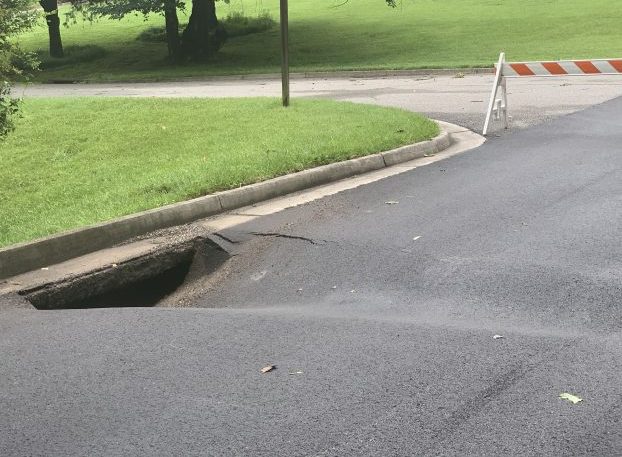Rep. Hurt Is In Lock-Step
Published 2:55 pm Tuesday, January 24, 2012
Editor, The Herald:
I would like to comment on Representative Robert Hurt's Op-Ed piece in the January 13 issue of the Herald titled “American Solutions For Job Creation”. In particular I would like to focus on the construction of the Keystone XL pipeline which Rep. Hurt is promoting as a source of American jobs and a partial solution to our country's dependence on foreign oil. There is much that Rep. Hurt has left out about this entire project.
For the information of those not aware of it, the Keystone XL is a pipeline which will transport a type of crude oil extracted from tar sand located in Alberta, Canada to American oil refineries on the coast of the Gulf of Mexico. When completed it will mostly be underground, 1,661 miles long and 3 feet in diameter, will cost $7 billion to build and transport 700,000 barrels of oil per day. Its construction must be approved in February by President Obama.
Trending
Rep. Hurt writes in his piece the following: “One of the ways in which we can trigger immediate job creation, alleviate pain at the pump, and strengthen our national security is by curbing our dependence on foreign oil. Skyrocketing fuel prices are threatening our economic recovery by stifling job creation, impeding productivity, and causing burdens on 5th District families.”
While it may be true that buying crude oil from Canada lessens our dependence on Middle Eastern oil and that is a good thing, the last time I checked Canada is still a foreign country. Skyrocketing fuel prices are obviously a bad thing for our economy but Rep. Hurt does not mention that petroleum products derived from tar sands will be very expensive. This is because extracting the oil from the tar sand is difficult and expensive. Once the tar sands close to the surface have been depleted the tar must be mined by pumping steam deep into the ground to melt the tar so that it can be pumped to the surface. The oil in the form of bitumen must then be separated from the sand and water and then diluted with petroleum distillates so that it can be pumped through the pipeline. Bitumen itself is a very dirty, toxic form of oil which is difficult to refine into products such as gasoline and fuel oil. It must be pointed out that such refined products will then be sold on the international market at a profit to the oil companies which will sell it. The products won't be dedicated to the U.S. Market. (Right now the United States is a net exporter of gasoline, diesel and jet fuel.) I can't see that petroleum products derived from Canadian tar sands will decrease their price. In addition, even if the added supply of crude oil threatens to drive down that price, Middle Eastern countries such as Saudi Arabia can just curtail their production to support the price. In the long run adding to the supply of crude oil will just delay implementing non-carbon based energy systems which will produce true energy independence for America.
Rep. Hurt barely mentions the threat to the environment which tar sand oil presents. Extracting the bitumen from the tar sand produces a lot of contaminated waste water which must be dealt with. While that waste will be generated in Canada, right now the cost of dealing with it is not built into the cost of the oil, just like the cost of dealing with radioactive waste from nuclear power plants has not yet been dealt with. While present-day Republicans such as Rep. Hurt like to gloss over or deny environmental problems of energy production, the potential for serious and expensive damage to the environment with tar sand oil is very real.
The pipeline itself will be built over an aquifer in the Great Plains states which is very close to the surface. Any leak will contaminate the ground water now being used for agriculture and by grazing livestock. Even trace amounts of chemicals from the bitumen can be devastating. If the pipeline leaks, as they eventually all do, who will pay for the cleanup and compensate the farmers and ranchers?
This is why the governments of states such as Nebraska are against the pipeline being built through their states. Oil companies always claim that the risk of an accident is low. The wreck of the Exxon Valdez in Alaska and the recent BP oil leak in the Gulf of Mexico are examples of how assurances like that are hollow.
As for jobs, it has been estimated that 20,000 short term jobs will be created during the construction of the pipeline as Rep. Hurt has stated. However, I have read that many of those jobs are highly skilled ones which will be supplied by the company building the pipeline, TransCanada. Will these be American jobs or workers brought in by TransCanada? Will the steel used to construct the pipeline be made in American mills? I just can't see how the construction of Keystone XL will produce hundreds of thousands of jobs stemming from the pipeline's completion as Rep. Hurt contends. That is a gross exaggeration. I further can't see how it will produce any jobs in Rep. Hurt's 5th District.
Trending
Rep. Hurt's piece shows that he has fallen in lockstep with his fellow Republicans in the U.S. House of Representatives. He has not referred to the very serious issues of price and environmental problems associated with the Keystone XL pipeline which is very misleading on his part. It is a very complex project with many pros and cons. Perhaps he should spend more time on how to create real and near term jobs in the 5th District of Virginia.
Marshall Cohen
Farmville





